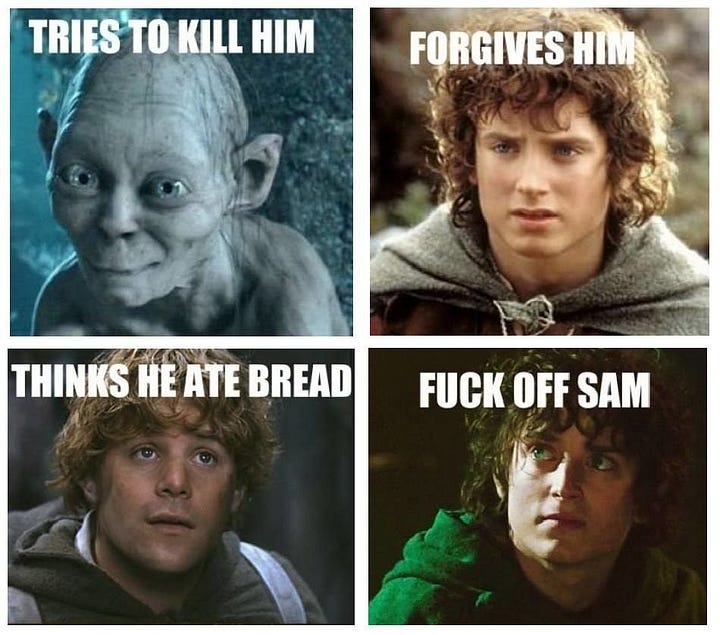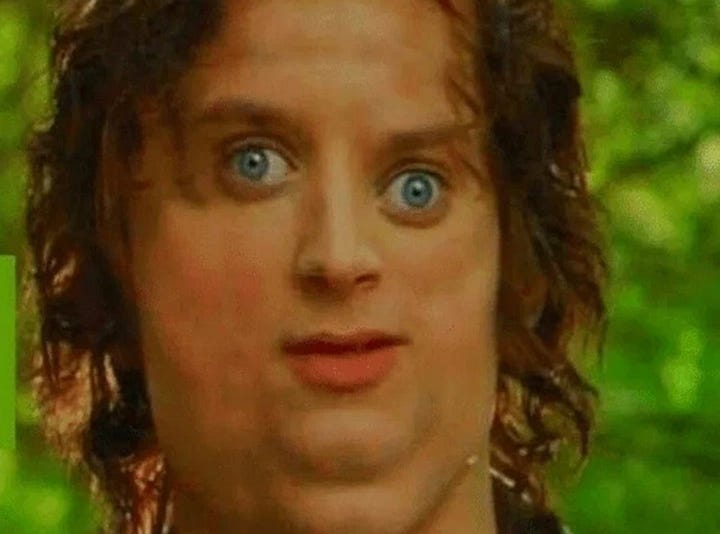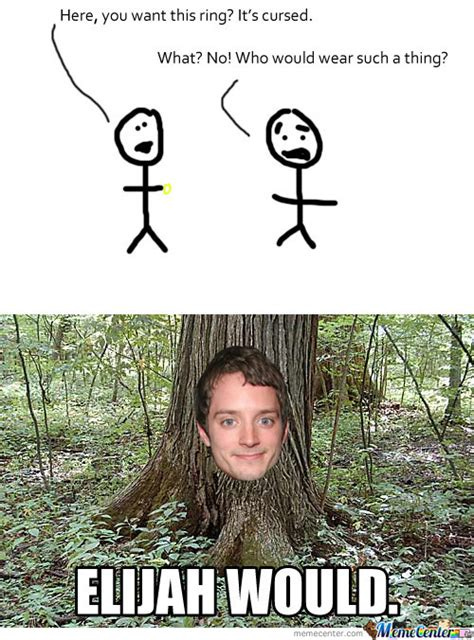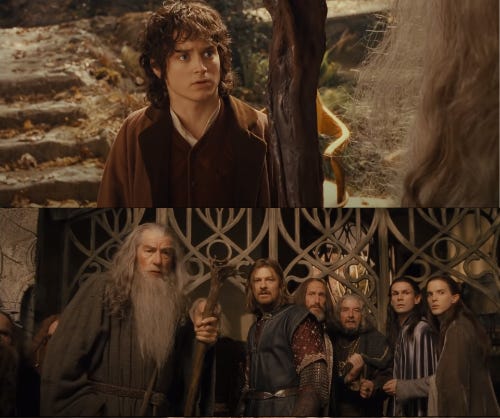In Hobbit culture thirty-three is an auspicious age. It’s not only the year a young Hobbit becomes an adult, it’s also the year Frodo Baggins first came to own the Ring.
“…and Frodo was going to be thirty-three, 33, an important number: the date of his ‘coming of age.’ ”
Frodo didn’t embark on his journey to destroy the ring for seventeen years thereafter. The device sat forgotten by almost all in a chest in his Bag End home, while Gandalf the World-Weary raced across Middle-earth seeking to confirm his fear, hoping to rebut it.
My first, first window into The Lord of the Rings world was through—like most—The Hobbit. My brother would read a chunk or a chapter and then synopsize it for me. We had the edition released in 2001, ahead of the release of the first Jackson adaptation. We are a family of nerds.
Elijah Wood, you doubtless know, played Frodo in The Lord of the Rings, and much of the internet likes to tease and meme-ify his performance, and Jackson’s interpretation, which was at times whiney, naïve, and inaccurate to the books’ more stoic and suffering character.




For a while, that soured me on the character of Frodo, as I think it did many fans of The Lord of the Rings. Here was this Hobbit, holding the entire malice and greed of the world on a chain around his neck, in his fifties, trekking far from his bourgeois home, past orcs and goblins, dragon lairs and the abodes of old dragons, through armed conflicts, being harried by demons of the netherworld, and he had the nerve to complain about it.
Wood was too young: by the time Frodo set out on his auspicious quest he was fifty. Elijah was eighteen. These days, I think Elijah played Frodo excellently. So do lots of others.
In my college apartment, where The Lord of the Rings was zeitgeist, we had a maxim: “don’t judge a man by his words, but by his opinion of Boromir.” We were hard up on the machismo general, the man voicing that the Ring was a gift, a weapon to be used, who was campaigned for militarization, who lusted after the Ring, broke the Fellowship, but heroically defended Frodo to his dying breath.
“I would have followed you forever, my brother, my captain, my king.” —the guy who just tried to take the Ring from the Ringbearer by force.
Even, for a while, I thought that Tolkien had dunked on Frodo by having him fail at the end. I had what Tolkien himself would call, not disparagingly, a “simple mind” on the issue. For, if you somehow don’t know, at the end of the long tale, Frodo falters when finally in Mt. Doom, about to destroy the Ring.
“…and there on the brink of the chasm, at the very Crack of Doom, stood Frodo, black against the glare, tense, erect, but still as if he had been turned to stone.
“ ‘Master!’ cried Sam.
“Then Frodo stirred and spoke with a clear voice, indeed with a voice clearer and more powerful than Sam had ever heard him use, and it rose above the throb and turmoil of Mount Doom, ringing in the roof and walls.
“ ‘I have come,’ he said. ‘But I do not choose now to do what I came to do. I will not do this deed. The Ring is mine!’ ”
The Ring, knowing its doom is at hand, has summoned all its strength of greed and malice and arrested Frodo’s heart, and he, under all that pressure, breaks. To me, for a long time, this was a failure. The Ring is, thankfully, destroyed despite Frodo’s failure. Gollum, seeking it for himself, knocks the Ring into the fires that can unmake it.
It’s upsetting to read—and enraging to watch. But I wouldn’t have taken the Ring as far as Mordor; I would have happily handed it over to Boromir. And Gollum wouldn’t have been in the Crack of Doom without Frodo’s earlier mercy, which spared the wretch’s life.
“Frodo's was not a moral failure. In the Cracks of Doom the Ring's pressure reached its maximum upon Frodo, after long possession, months of torment, starvation, and exhaustion. He had done what he could, spent himself completely, and produced a situation in which the object of his quest could be achieved. His humility, sufferings, and patience and mercy towards Gollum were rewarded: his failure was redressed.”
- from Tolkien Gateway
I asked my father once who is favorite character in The Lord of the Rings was. It might have been at a dinner when I was in college—he would come visit and take me out—or in a long car ride. I can’t remember. He was so excited when The Lord of the Rings movies came out. I remember he got to see Fellowship in a jam-packed theater while my mother took my brother and me to see the Jimmy Neutron movie. He thought about his answer for only a moment.
“Frodo,” he said. “He took the Ring.”
And I think that’s a really good point—the best point that can be made on the subject.
My dad, who was at Woodstock, who spent three months in Little Havana living off poker winnings, had been a lanky Strider, or Aragorn, the king-in-exile who for a time helps guide Frodo to Mordor.
In high school he was a three sport athlete. In football, in a brawl, he once punched a ref in the face. He thought it was an opposing player grabbing his shoulder. He still feels wretched about it. He was Boromir, then.
By the time he was a father to two college kids he was a Theoden, king of Rohan, wily and wise and wary and utilitarian.
I think he makes a damn good point.
So Frodo was thirty-three when he inherited the Ring and I recently turned thirty-three.
I think who you love in a story as timeless as The Lord of the Rings is seasonal.
It’s a rich, deep text. I’ve always loved Sam—loyal, stalwart, a little clueless, but desperately loyal Sam. As I said, in college I looked up to Boromir, especially his brave heroism and self-sacrifice at the end.
When I was a new teacher, when I wished I knew everything, I looked up to Gandalf.
But now I’m thirty-three. I’m married. I have a house and a garden and I could easily live the life that Sam Gamgee had, before and after all this, “nonsense with the Ring.”
Frodo, too, had a happy, easy life waiting for him in the Shire when, at the Council of Elrond, he said he could take the Ring. He could have said no. What on Middle-earth made him say, “I’ll take the Ring to Mordor. Though I do not know the way,” aside from something really worthy of admiration?
“‘If only that dratted wizard will leave young Frodo alone, perhaps he’ll settle down and grow some hobbit-sense.’ [the residents of the Shire] said.”
So what’s my Ring? Is there one? You were probably expecting this all to lead to some great announcement, to all mean something in the end.
But it doesn’t. It’s just a story. Thanks for reading.







